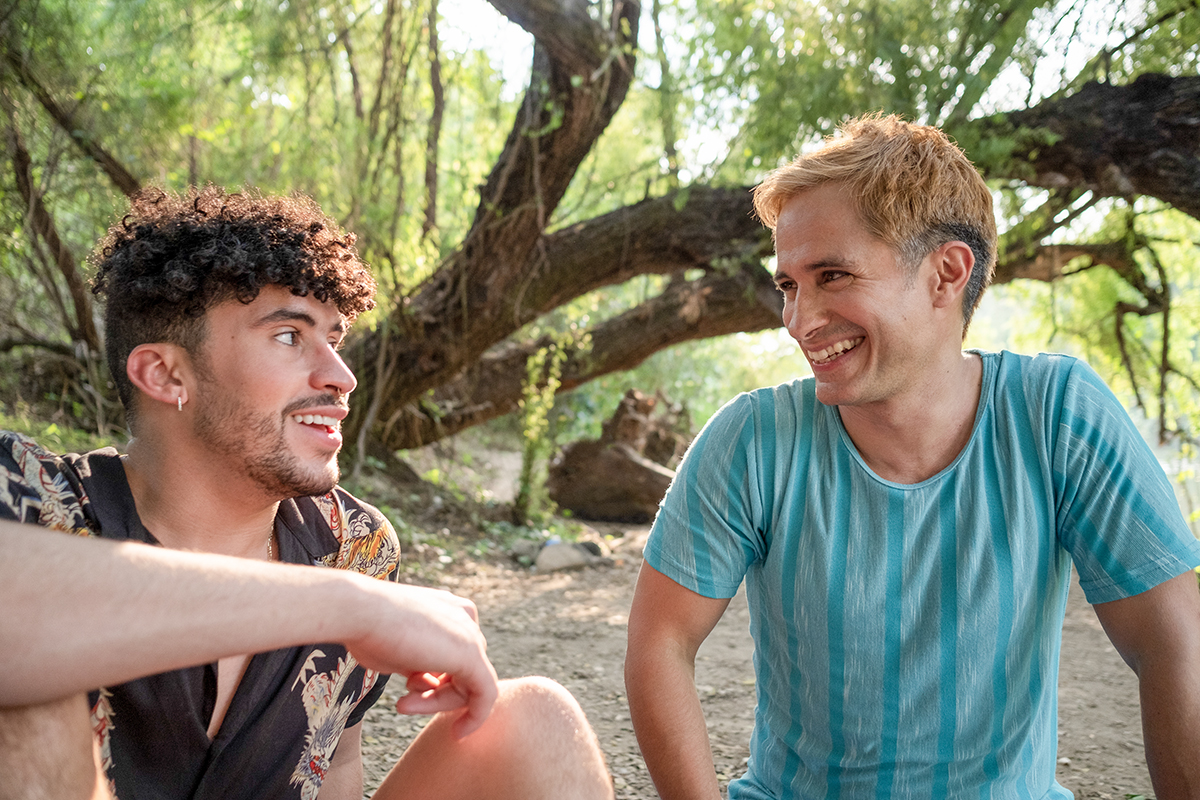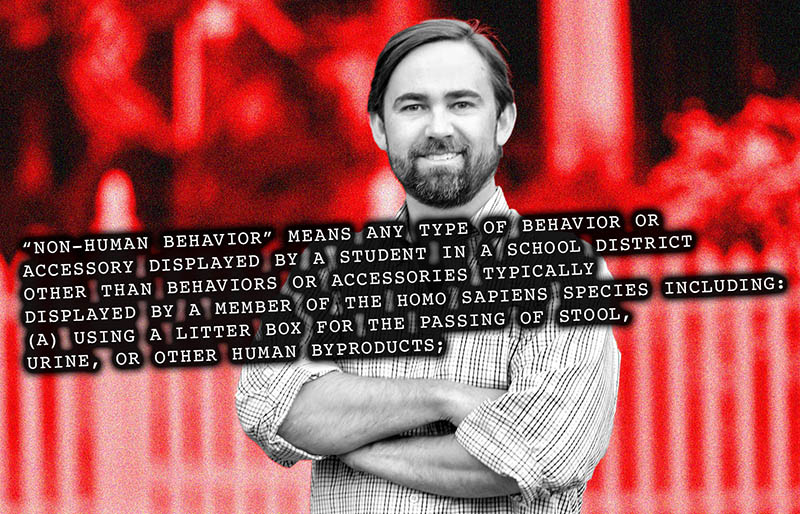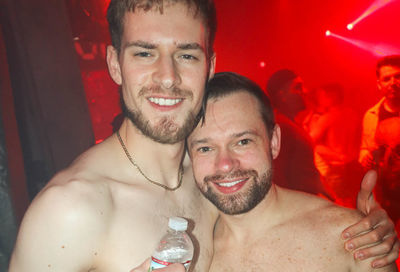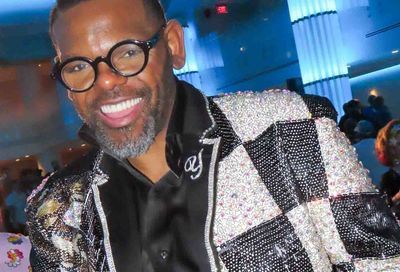‘Cassandro’ Review: Wrestle Mania
'Cassandro' spins gripping drama from tale of a showman who became a legend by daring to be gay and femme in a muy macho arena.

The honorable Benito Antonio Martínez Ocasio — known to millions around the globe as billions-streaming Latin music superstar, and sometime WWE wrestler, Bad Bunny — acquits himself handsomely in the thrilling biopic Cassandro (★★★★☆).
Appearing in only his second major film role, following an amusing turn as an assassin in Bullet Train, the performer brings loads of charisma and sexual tension to the part of Felipe, occasional drug dealer and object of desire to real-life Mexican professional wrestler Cassandro the Exótico, brilliantly portrayed by Gael García Bernal.
The casting is noteworthy not only as a savvy commercial move, but as a pointed expression of the gender fluidity the movie celebrates, which Ocasio also famously toys with in his pop star persona. Of course, Cassandro the Exótico does more than just toy with gender expression.
Donning glamorous makeup and costumes, and competing on the macho Mexican lucha libre circuit as a proudly out gay man, Cassandro breaks down barriers as a fabulously femme athlete and entertainer, in turn becoming a champion and legend. As depicted in the film — an impressive narrative feature directing debut by Oscar-winning documentarian Roger Ross Williams — Cassandro’s road to stardom makes for a scrappy underdog story that Bernal leads with moving soul, tenacity, and sensitivity.
The script, by Williams and David Teague, finds Cassandro (real name Saúl Armendáriz) hacking it in his early career as an evasive, but not very effective, lower-rung wrestler still going by the ring name “El Topo,” i.e., The Mouse.
When he’s not being whipped around in the ring by masked brutes like Gigántico (played by actual luchador Murder Clown), Saúl is working at a garage and car wash in his hometown of El Paso, or mending clothes for his laundress mom, Yocasta (Perla De La Rosa, in a fine supporting turn).
De La Rosa and Bernal forge a sweetly authentic, yet complicated rapport as a working-class mom and son who rely on each other for friendship and support. Both, in their own ways, are still processing the pain of Saúl’s dad not being a part of their lives.
The film returns again and again to Yocasta’s favorite pastime, sitting with Saúl in their car, parked at the baseball diamond where she hopes her son’s deadbeat dad might appear and reunite with his family.
In the meantime, she blames Saúl for the man’s absence, holding fast to the notion that the man would rather abandon his family than stay to raise a gay son. Rather than sink into that false shame, Saúl tries to rise above it by embracing his identity with his new lucha persona as Cassandro the Exótico.

Crucially, we see Saúl initially reject the idea of fighting as an exótico, a class of extravagantly feminized luchadors treated as clowns in the sport, because, as he points out, they don’t let exóticos win. Presumably, no macho luchador in the strictly negotiated match world wants to be taken down by a queen.
But Saúl wants to win. That fighting spirit first attracts the attention of fellow wrestler, Sabrina (A League of Their Own’s Roberta Colindrez), who competes professionally as badass luchadora Lady Anarquía. She agrees to train him, and soon they garner the support of wrestling promoter Lorenzo (Joaquín Cosío), who further offers his laidback right-hand man, Felipe, to grease the wheels for anything Cassandro might want.
What Cassandro might really want is Felipe. The flirtatious energy between Bernal and Ocasio certainly heats up the screen. But the man Cassandro actually falls for is another luchador, El Comandante, or Gerardo, a seemingly straight, married man played by Looking hunk Raúl Castillo. The pair’s clandestine romance, characterized by Cassandro as, “There when you wanted to fuck me, out of your way when you didn’t,” predictably, hits several snags as Cassandro’s fame grows.
Castillo, excellent in a similarly macho role in last year’s queer-themed military drama The Inspection, does well here as a man caught between his undeniable affection for another man, and the pressing need to stick to the straight and narrow. Bernal also offers a sense of vulnerability and yearning for love, but laced with a determination that’s as stirring as the uplifting score by Marcelo Zarvos.
The music aptly complements the exceptionally intimate cinematography by Matias Penachino, who keeps the camera right in the heat of the action, whether in bed with Cassandro and Gerardo, in that parked car with mom and son, or in the ring with Cassandro pounding opponents into the mat.
A consummate showman, Cassandro is able to turn even a losing match into a win with the crowd, and ultimately, for himself, his family, and his queer fans. “I just try to be myself,” he explains, humbly understating the power he wields both inside and outside the ring.
Cassandro is playing in select theaters, including Landmark’s E Street and Bethesda Row Cinemas, and is available for streaming on Prime Video. Visit www.amazon.com.
Support Metro Weekly’s Journalism
These are challenging times for news organizations. And yet it’s crucial we stay active and provide vital resources and information to both our local readers and the world. So won’t you please take a moment and consider supporting Metro Weekly with a membership? For as little as $5 a month, you can help ensure Metro Weekly magazine and MetroWeekly.com remain free, viable resources as we provide the best, most diverse, culturally-resonant LGBTQ coverage in both the D.C. region and around the world. Memberships come with exclusive perks and discounts, your own personal digital delivery of each week’s magazine (and an archive), access to our Member's Lounge when it launches this fall, and exclusive members-only items like Metro Weekly Membership Mugs and Tote Bags! Check out all our membership levels here and please join us today!

























You must be logged in to post a comment.